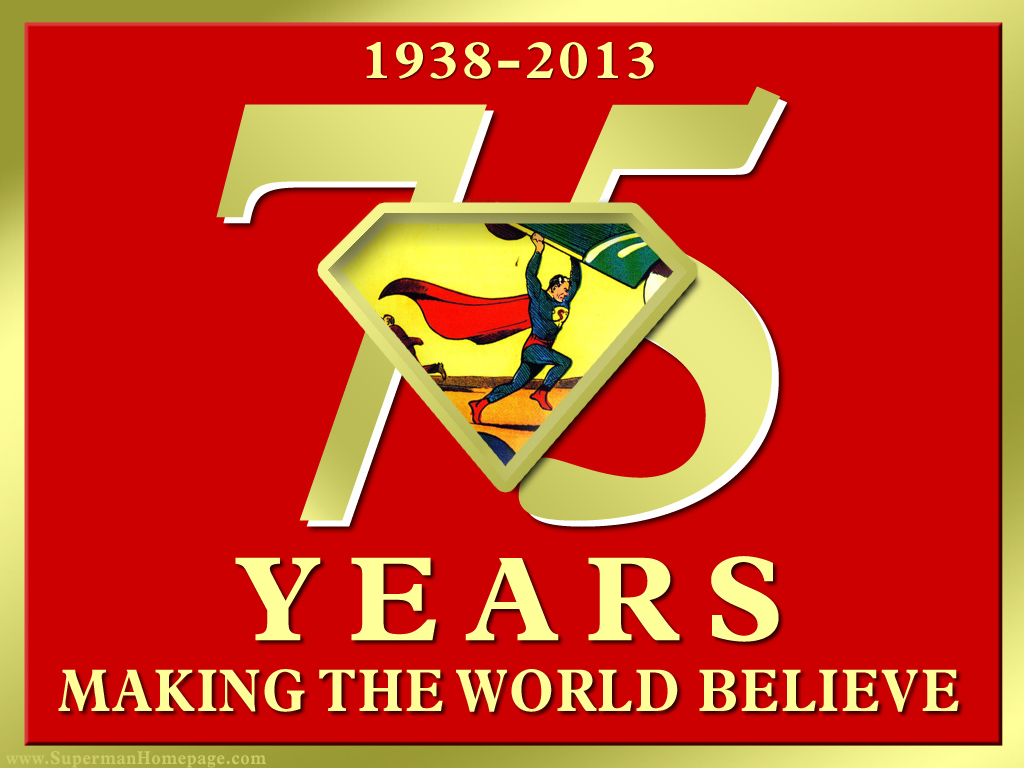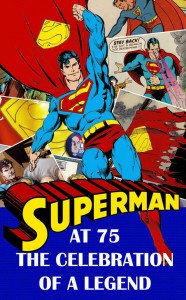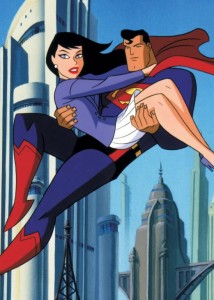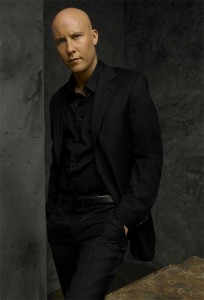Why SUPERMAN still looks good at 75 years old…
(Honestly, I don’t think Clark looks a day over 30.)
 Although there are a great number of combinant cultural factors why Superman has endured 75 years, celebrating his birthday today and waiting breathlessly for the upcoming Man of Steel film this summer, I think the deepest secret of his longevity is how obvious a parallel his story structure shares with the ultimate bringer of truth, justice, and life.
Although there are a great number of combinant cultural factors why Superman has endured 75 years, celebrating his birthday today and waiting breathlessly for the upcoming Man of Steel film this summer, I think the deepest secret of his longevity is how obvious a parallel his story structure shares with the ultimate bringer of truth, justice, and life.
“Live as one of them, Kal-El, to discover where your strength and power are needed… They can be a great people, Kal-El, they wish to be. They only lack a light to show them the way. For this reason… I have sent them you….. my only son.” – Jor-El, Superman
 There are heroic films like Batman Begins, The Matrix, Lord of the Rings, Last of the Mohicans, etc. that depict a protagonist, hero, savior (sometimes a small group) – someone inspiring who rises up and challenges the story’s antagonist(s) and sacrifices himself for others, or at least demonstrates the willingness to do so. Life Transcendent stories grasp at shades of hope for that redeemer; either of these can preach pretty easily, and it’s hard to find an example of the latter more brazen, more obvious than the 20th century’s story-formed Superman.
There are heroic films like Batman Begins, The Matrix, Lord of the Rings, Last of the Mohicans, etc. that depict a protagonist, hero, savior (sometimes a small group) – someone inspiring who rises up and challenges the story’s antagonist(s) and sacrifices himself for others, or at least demonstrates the willingness to do so. Life Transcendent stories grasp at shades of hope for that redeemer; either of these can preach pretty easily, and it’s hard to find an example of the latter more brazen, more obvious than the 20th century’s story-formed Superman.
Most of us hear “Superman” and think of the blue suit, the red cape, the spit-curl and the outstretched arm as he flies through the air. From there, our mind might jump to details depending on our initial introduction to the mythos, from an animated series to any number of mediums. He’s certainly seen a wealth of interpretations, variation, and a century of accruing and evolving attributes. Some of us instantly think of an art image by Ed McGuinness while others conjure pictures of Christopher Reeve, or Tom Welling.
Acknowledging there is quite a bit of variation on the finer points, let’s take a look at 10 curious and fairly standard facets of the Kryptonian hero of comics, books, television, film, and video games:
- A loving father sends his only son to our world. (In the 1979 film and other variations, his ship even resembles a shimmering star, heralding his arrival as a gift to the earth.)
- The boy, Clark Kent, is raised in a small rural town.
- Clark has a caring mother Martha, and is raised in the hands-on blue-collar trade of his adoptive father Jonathan..
- Growing to maturity, this boy looks (and in many ways is) just like one of us… yet possesses powers and abilities beyond those of mortal men.
- When he is of age, Clark embarks on his life’s mission and travels to the big city—the metropolis of man—to seek and save.
- He humbles himself daily to walk among the citizens of Metropolis as a common man and often receives ridicule from those around him, seen by others as mild-mannered, humble to a “fault”, nothing special. This “super man” doesn’t incarnate and dwell among us as people might expect.
 He pursues an irascible “bride” (Lois Lane) who constantly puts herself—and others—in danger, yet he persists in saving her again and again as her Superman. (Many times he doesn’t even get a thank you.)
He pursues an irascible “bride” (Lois Lane) who constantly puts herself—and others—in danger, yet he persists in saving her again and again as her Superman. (Many times he doesn’t even get a thank you.)- He doesn’t conceal his face, yet the prideful and self-absorbed Lois interacts with his meek, humble persona and fails to recognize him for who he really is.
- Superman withdraws for rest and refreshment to a fortress of solitude, where he can effectively communicate with the spirit-like ‘essence” of his true father.
- Clark’s nemesis in this world (Lex Luthor) is a man with no powers, just an intellect that—while impressive—is matched by his arrogance. He refuses to admit his (or the world’s) need for a super savior and wants the world to exist without Superman (and to glorify Luthor instead).
Clark is both transcendent as Superman (alien, high above us, more powerful than we can imagine) and quite imminent as Clark Kent (honestly relational, personal and patient). In various stories, Clark has even laid down his life for his bride Lois, for the world, and subsequently experienced a comic-book resurrection.
 Bottom line? We’re not Superman. Although not a god, the construction of this narrative removes us from “being” the hero. Clark is alien; we couldn’t be Superman if we wanted to. He is unique, one of a kind. While his actions inspire emulation at a human level, he is a shining beacon on a hill to everyone in the city: a testament to truth and justice.
Bottom line? We’re not Superman. Although not a god, the construction of this narrative removes us from “being” the hero. Clark is alien; we couldn’t be Superman if we wanted to. He is unique, one of a kind. While his actions inspire emulation at a human level, he is a shining beacon on a hill to everyone in the city: a testament to truth and justice.
Hopefully the parallels are obvious. From John 3:16 where the Father sends his only son into the world (and a shining star signals his birth) the narrative hits just keep on coming. Jesus was raised in the rural, dumpy “Smallville” called Galilee, educated in the family trade by his adoptive father Joseph, and eventually headed out for ministry when he came of age that would culminate in the “metropolis” of Jerusalem. Scripture talks about how no one expected the messiah to come as Jesus did—he was meek, mild-mannered, humble—and how even those expecting him didn’t recognize him in his humble incarnation. The Bible also records that he would withdraw to isolated places for Sabbath rest (solitude) and pray to his father in heaven. As messiah, scripture is clear that Jesus consistently pursues, woos, and saves his frequently rebellious “bride” the church, ultimately by his death and resurrection.
“…though he was in the form of God, did not count equality with God a thing to be grasped but emptied himself, taking the form of a servant, being born in the likeness of men. And being found in human form, he humbled himself by becoming obedient to the point of death, even death on a cross. Therefore God has highly exalted him… every knee should bow, in heaven and on earth and under the earth, and every tongue confess that Jesus Christ is Lord, to the glory of God the Father.” – Philippians 2
“Look! Up in the sky…”
All of us fall into one of two corresponding categories, then, in relation to the true story of savior: we’re Lois Lane or Lex Luthor. Either we humbly recognize we are the church—the willful and ignorant bride of Christ, suffering from frequent folly and repeatedly failing to recognize the servant-minded savior for who he is—or we remain as Lex Luthor, believing our intellect is king, we are our own savior, and we have no need of help from above. We can rule ourselves and this world just fine.
Question: are you Lois, or Lex?
This is an excerpt from our book Cinemagogue: Reclaiming Entertainment and Navigating Narrative for the Myths and Mirrors they were Meant to Be, available at Amazon.com and other retailers. We discuss Superman, as well as many other characters, movies and story, to understand the root of storytelling and the recurring connections to our Master Storyteller.
I had an opportunity to examine our favorite Kryptonian son at a film event: you can listen to the audio using the player below or download the mp3.
Podcast: Play in new window | Download
Subscribe: Apple Podcasts | RSS



